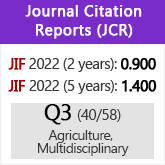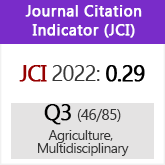Growth promotion and yield enhancement of barley cultivars using ACC deaminase producing Pseudomonas fluorescens strains under salt stress
Abstract
Plant growth-promoting rhizobacteria containing 1-aminocyclopropane-1-carboxylate (ACC) deaminase enzyme reduce the level of stress, ethylene and stimulate plant growth under various biotic and abiotic stress conditions. The present study aims at characterizing efficient salt-tolerant, ACC deaminase containing Pseudomonas fluorescens strains with plant growth-promoting activity isolated from the rhizosphere of barley plants and evaluating the influence of potent plant growth-promoting rhizobacteria (PGPR) isolates on growth and yield of five barley cultivars under salinity stress. Plant growth and yield in barley cultivars following inoculation with salt-tolerant, ACC deaminase producing PGPR strains under salt stress were quantified. Results indicated that under various levels of salinity (50, 100 and 150 mM NaCl) inoculation with PGPRs had positive impact on growth parameters and yield of barley cultivars including plant height, spike length, weight and number, peduncle length, number of grains per spike, 1000-grain weight and grain yield, comparing to uninoculated control plants under salinity stress. Inoculation of barley cultivars with bacteria ameliorated the negative effects of salinity and resulted in increase in growth and yield. Besides, as the salinity levels increased, growth and yield of barley cultivars decreased; however, cultivars showed different responses to salt stress. This study demonstrates the vital role of rhizobacteria containing ACC deaminase for increasing salt tolerance and consequently improving the growth and yield of barley plants under salinity stress.
Downloads
References
Akhgar AR, Arzanlou M, Bakker PAHM, Hamidpour M, 2014. Characterization of 1-aminocyclopropane-1-carboxylate (ACC) deaminase-containing Pseudomonas spp. in the rhizosphere of salt-stressed canola. Pedosphere 24: 461-468. https://doi.org/10.1016/S1002-0160(14)60032-1
Bal HB, Nayak L, Das S, Adhya TK, 2013. Isolation of ACC deaminase producing PGPR from rice rhizosphere and evaluating their plant growth promoting activity under salt stress. Plant Soil 366: 93-105. https://doi.org/10.1007/s11104-012-1402-5
Bar-Yosef B, Rogers RD, Wolfram JH, Richman E, 1999. Pseudomonas cepacia-mediated rock phosphate solubilization in kaolinite and montmorillonite suspensions. Soil Sci Soc Am J 63: 1703-1708. https://doi.org/10.2136/sssaj1999.6361703x
Belimov AA, Hontzeas N, Safronova VI, Demchinskaya SV, Piluzza G, Bullitta S, Glick BR, 2005. Cadmium-tolerant plant growth-promoting rhizobacteria associated with the roots of Indian mustard (Brassica juncea L. Czern). Soil Biol Biochem 37: 241-250. https://doi.org/10.1016/j.soilbio.2004.07.033
Bric JM, Bostock RM, Silverstone SE, 1991. Rapid in situ assay for indoleacetic acid production by bacteria immobilized on a nitrocellulose membrane. Appl Environ Microbiol 57: 535-538.
Cakmakci R, Erat M, Erdogan U, Dönmez MF, 2007. The influence of plant growth-promoting rhizobateria on growth and enzyme activities in wheat and spinach plants. J Plant Nutr Soil Sci 170: 288-295. https://doi.org/10.1002/jpln.200625105
Compant S, Clément C, Sessitsch A, 2010. Plant growth-promoting bacteria in the rhizo- and endosphere of plants: Their role, colonization, mechanisms involved and prospects for utilization. Soil Biol Biochem 42: 669-678. https://doi.org/10.1016/j.soilbio.2009.11.024
Dazzo FB, Yanni YG, Rizk R, de Bruijn FJ, Rademaker J, Squartini A, Corich V, Mateos P, Martínez-Molina E, 2000. Progress in multinational collaborative studies on the beneficial association between Rhizobium leguminosarum bv. trifolii and rice. In: The quest for nitrogen fixation in rice; Ladha JK, Reddy PM (eds.). pp: 167-189. IRRI, Los Baños, Philippines.
Deepa CK, Dastager SG, Pandey A, 2010. Isolation and characterization of plant growth promoting bacteria from non-rhizospheric soil and their effect on cowpea (Vigna unguiculata (L.) Walp.) seedling growth. World J Microbiol Biotechnol 26: 1233-1240. https://doi.org/10.1007/s11274-009-0293-y
Dell'Amico E, Cavalca L, Andreoni V, 2005. Analysis of rhizobacterial communities in perennial Graminaceae from polluted water meadow soil, and screening of metal-resistant, potentially plant growth-promoting bacteria. FEMS Microbiol Ecol 52: 153-162. https://doi.org/10.1016/j.femsec.2004.11.005
Dimkpa C, Weinan T, Asch F, 2009. Plant-rhizobacteria interactions alleviate abiotic stress conditions. Plant Cell Environ 32: 1682-1694. https://doi.org/10.1111/j.1365-3040.2009.02028.x
Dworkin F, Foster J, 1958. Experiments with some microorganisms which utilize ethane and hydrogen. J Bacteriol 7: 592-601.
Egamberdieva D, 2007. The effect of plant growth promoting bacteria on growth and nutrient uptake of maize in two different soils. Appl Soil Ecol 36: 184-189. https://doi.org/10.1016/j.apsoil.2007.02.005
Egamberdieva D, 2009. Alleviation of salt stress by plant growth regulators and IAA producing bacteria in wheat. Acta Physiol Plant 31: 861-864. https://doi.org/10.1007/s11738-009-0297-0
Egamberdieva D, 2011. Survival of Pseudomonas extremorientalis TSAU20 and P. chlororaphis TSAU13 in the rhizosphere of common bean (Phaseolus vulgaris) under saline conditions. Plant Soil Environ 57: 122-127. https://doi.org/10.17221/316/2010-PSE
Egamberdieva D, Li L, Lindström K, Räsänen L, 2016. A synergistic interaction between salt tolerant Pseudomonas and Mezorhizobium strains improves growth and symbiotic performance of liquorice (Glycyrrhiza uralensis Fish.) under salt stress. Appl Microbiol Biotechnol 100: 2829-2841. https://doi.org/10.1007/s00253-015-7147-3
Egamberdieva D, Davranov K, Wirth S, Hashem A, Abd Allah EF, 2017. impact of soil salinity on the plant-growth-promoting and biological control abilities of root associated bacteria. Saudi J Biol Sci 24: 1601-1608. https://doi.org/10.1016/j.sjbs.2017.07.004
Gholami A, Shahsavand S, Nezarat S, 2009. The effect of plant growth promoting rhizobacteria (PGPR) on germination, seedling growth and yield of maize. World Acad Sci Eng Technol 49: 19-24.
Glick BR, 1995. The enhancement of plant growth by free living bacteria. Can J Microbiol 41: 109-117. https://doi.org/10.1139/m95-015
Glick BR, Penrose DM, Li J, 1998. A model for the lowering of plant ethylene concentration by plant growth-promoting bacteria. J Theor Biol 190: 63-68. https://doi.org/10.1006/jtbi.1997.0532
Glick BR, Cheng Z, Czarny J, Duan J, 2007a. Promotion of plant growth by ACC deaminase-producing soil bacteria. Eur J Plant Pathol 119: 329-339. https://doi.org/10.1007/s10658-007-9162-4
Glick BR, Todorovic B, Czarny J, Cheng Z, Duan J, McConkey B, 2007b. Promotion of plant growth by bacterial ACC deaminase. Crit Rev Plant Sci 26: 227-242. https://doi.org/10.1080/07352680701572966
Gray EJ, Smith DL, 2005. Intracellular and extracellular PGRP: Commonalities and distinctions in the plant-bacterium signaling processes. Soil Biol Biochem 37: 395-412. https://doi.org/10.1016/j.soilbio.2004.08.030
Grönemeyer JL, Burbano CS, Hurek T, Reinhold-Hurek B, 2012. Isolation and characterization of root-associated bacteria from agricultural crops in the Kavango region of Namibia. Plant Soil 356: 67-82. https://doi.org/10.1007/s11104-011-0798-7
Hu YC, Schmidhalter U, 2005. Drought and salinity: a comparison of their effects on the mineral nutrition of plants. J Plant Nut Soil Sci 168: 541-549. https://doi.org/10.1002/jpln.200420516
Islam MR, Madhaiyan M, Deka Boruah HP, Yim W, Lee G, Saravanan VS, Fu Q, Hu H, Sa T, 2009. Characterization of plant growth-promoting traits of three-living diazotrophic bacteria and their inoculation effects on growth and nitrogen uptake of crop plants. J Microbiol Biotech 19: 1213-1222. https://doi.org/10.4014/jmb.0903.3028
Jamali F, Sharifi-Tehrani A, Lutz MP, Maurhofer M, 2009. Influence of host plant genotype, presence of a pathogen, and coinoculation with Pseudomonas fluorescens strains on the rhizosphere expression of hydrogen cyanide-and 2, 4-diacetylphloroglucinol biosynthetic genes in Pseudomonas fluorescens biocontrol strain CHA0. Microb Ecol 57: 267-275. https://doi.org/10.1007/s00248-008-9471-y
Khalid A, Arshad M, Zahir ZA, 2004. Screening plant growth-promoting rhizobacteria for improving growth and yield of wheat. J Appl Microbiol 96: 473-480. https://doi.org/10.1046/j.1365-2672.2003.02161.x
King EO, Ward MK, Raney DE, 1954. Two simple media for the demonstration of pyocyanin and fluorescein. J Lab Clin Med 44: 301-307.
Lucy M, Reed E, Glick BR, 2004. Applications of free living plant growth-promoting rhizobacteria. Antonie van Leeuwenhoek 86: 1-25. https://doi.org/10.1023/B:ANTO.0000024903.10757.6e
Lugtenberg BJJ, Dekkers L, Bloemberg G V, 2001. Molecular determinants of rhizosphere colonization by Pseudomanas. Annu Rev Phytopathol 39: 461-490. https://doi.org/10.1146/annurev.phyto.39.1.461
Majeed A, Kaleem Abbasi M, Hameed S, Imran A, Rahim N, 2015. Isolation and characterization of plant growth- promoting rhizobacteria from wheat rhizosphere and their effect on plant growth promotion. Front Microbiol 6: 1-11. https://doi.org/10.3389/fmicb.2015.00198
Mayak S, Tirosh T, Glick BR, 2004. Plant growth-promoting bacteria confer resistance in tomato plants to salt stress. Plant Physiol Biochem 42: 565-572. https://doi.org/10.1016/j.plaphy.2004.05.009
Munns R, Tester M, 2008. Mechanisms of salinity tolerance. Ann Rev Plant Biol 59: 651-681. https://doi.org/10.1146/annurev.arplant.59.032607.092911
Niu X, Bressan RA, Hasegawa PM, Pardo JM, 1995. Ion homeostasis in NaCl stress environments. Plant Physiol 109: 735-742. https://doi.org/10.1104/pp.109.3.735
Nowak J, 1998. Review benefits of in vitro bacterization of plant tissue cultures with microbial inoculants. In vitro Cell Dev Biol Plant 34: 122-130. https://doi.org/10.1007/BF02822776
Paul D, Nair S, 2008. Stress adaptations in a plant growth promoting rhizobacterium (PGPR) with increasing salinity in the coastal agricultural soils. J Basic Microbiol 48: 378-384. https://doi.org/10.1002/jobm.200700365
Qin S, Xing K, Jiang JH, Xu LH, Li WJ, 2011. Biodiversity, bioactive natural products and biotechnological potential of plant-associated endophytic actinobacteria. Appl Microbiol Biotechnol 89: 457-473. https://doi.org/10.1007/s00253-010-2923-6
Qin S, Zhang YJ, Yuan B, Xu PY, Xing K, Wang J, Jiang JH, 2014. Isolation of ACC deaminase-producing habitat-adapted symbiotic bacteria associated with halophyte Limonium sinense (Girard) Kuntze and evaluating their plant growth-promoting activity under salt stress. Plant Soil 374: 753-766. https://doi.org/10.1007/s11104-013-1918-3
Raaijmakers JM, Paulitz TC, Steinberg C, Alabouvette C, Moënne-Loccoz T, 2009. The rhizosphere: a playground and battlefield for soil-borne pathogens and beneficial microorganisms. Plant Soil 321: 341-361. https://doi.org/10.1007/s11104-008-9568-6
Shahid M, Hameed S, Imran A, Ali S, van Elsas JD, 2012. Root colonization and growth promotion of sunflower (Helianthusannuus L.) by phosphate solubilizing Enterobacter sp. Fs-11. World J Microbiol Biotechnol 28: 2749-2758. https://doi.org/10.1007/s11274-012-1086-2
Tank N, Saraf M, 2010. Salinity-resistant plant growth promoting rhizobacteria ameliorates sodium chloride stress on tomato plants. J Plant Interact 5: 51-58. https://doi.org/10.1080/17429140903125848
Yao L, Wu Z, Zheng Y, Kaleem I, Li C, 2010. Growth promotion and protection against salt stress by Pseudomonas putida Rs-198 on cotton. Eur J Soil Biol 46: 49-54. https://doi.org/10.1016/j.ejsobi.2009.11.002
Yildirim E, Taylor AG, Spittler TD, 2006. Ameliorative effects of biological treatments on growth of squash plants under salt stress. Scientia Hort 111: 1-6. https://doi.org/10.1016/j.scienta.2006.08.003
© CSIC. Manuscripts published in both the printed and online versions of this Journal are the property of Consejo Superior de Investigaciones Científicas, and quoting this source is a requirement for any partial or full reproduction.
All contents of this electronic edition, except where otherwise noted, are distributed under a “Creative Commons Attribution 4.0 International” (CC BY 4.0) License. You may read here the basic information and the legal text of the license. The indication of the CC BY 4.0 License must be expressly stated in this way when necessary.
Self-archiving in repositories, personal webpages or similar, of any version other than the published by the Editor, is not allowed.















